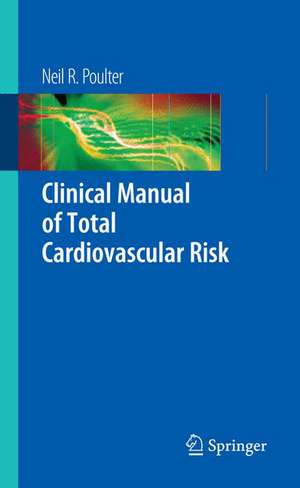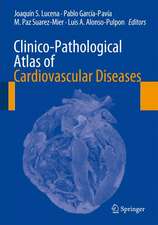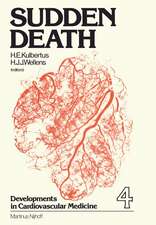Clinical Manual of Total Cardiovascular Risk
Autor Neil R. Poulteren Limba Engleză Paperback – 5 feb 2009
Preț: 325.86 lei
Preț vechi: 343.00 lei
-5% Nou
Puncte Express: 489
Preț estimativ în valută:
62.36€ • 66.68$ • 51.99£
62.36€ • 66.68$ • 51.99£
Carte tipărită la comandă
Livrare economică 18 aprilie-02 mai
Preluare comenzi: 021 569.72.76
Specificații
ISBN-13: 9781848002524
ISBN-10: 1848002521
Pagini: 114
Ilustrații: XII, 88 p. 30 illus. in color.
Greutate: 0.14 kg
Ediția:2009
Editura: SPRINGER LONDON
Colecția Springer
Locul publicării:London, United Kingdom
ISBN-10: 1848002521
Pagini: 114
Ilustrații: XII, 88 p. 30 illus. in color.
Greutate: 0.14 kg
Ediția:2009
Editura: SPRINGER LONDON
Colecția Springer
Locul publicării:London, United Kingdom
Public țintă
Professional/practitionerCuprins
Principles of Total Risk Management.- Identifying the patient at risk.- Strategies for cardiovascular risk management.- Current treatment targets.- The doctor–patient relationship.- Cardiovascular disease prevention: prospects for the future?.
Recenzii
From the reviews:
"This … book is a to-the-point summary of everything one must understand about cardiovascular risk. … This is an extraordinary book that primary care practitioners can easily use to modify the cardiovascular risks of their patients … . The references are complete and current. This small book is a must for every practitioner who treats cardiovascular disease patients." (Vincent F Carr, Doody’s Review Service, March, 2009)
"This … book is a to-the-point summary of everything one must understand about cardiovascular risk. … This is an extraordinary book that primary care practitioners can easily use to modify the cardiovascular risks of their patients … . The references are complete and current. This small book is a must for every practitioner who treats cardiovascular disease patients." (Vincent F Carr, Doody’s Review Service, March, 2009)
Notă biografică
Professor Neil Poulter is Professor of Preventative Cardiovascular Medicine and co-Director of the International Center for Circulatory Health, Imperial College London, UK. He is a co-author of the 2003 European Society of Hypertension-European Society of Cardiology guidelines for the management of arterial hyptertension among other papers and guidelines documents.
Textul de pe ultima copertă
Cardiovascular disease (CVD) is a major cause of morbidity and mortality in Western industrialized countries. The management of non-fatal stroke and heart attack consumes a major proportion of current healthcare budgets and has a huge detrimental impact on quality of life for both patients and their relatives. The multifactorial nature of CVD and the interactions between risk factors mean that it is difficult for clinicians to make an intuitive assessment of an individual’s future risk of disease. This has led to the production of a number of guidelines on the prevention of CVD, all of which recommend risk assessment tools to guide primary prevention strategies.
In a practical, easy to digest format, Clinical Management of Total Cardiovascular Risk presents the key data on all aspects of managing cardiovascular disease. Stressing the importance of identifying the patient at risk, Neil Poulter incorporates review of the current guidelines and outlines the options available when diagnosing, managing and treating these patients. Using algorithms to highlight key management decisions, this practical reference will be useful to all in the management of cardiovascular disease from primary care practitioners and physicians in the fields of prevention and rehabilitation to Residents in Internal Medicine and Cardiology.
In a practical, easy to digest format, Clinical Management of Total Cardiovascular Risk presents the key data on all aspects of managing cardiovascular disease. Stressing the importance of identifying the patient at risk, Neil Poulter incorporates review of the current guidelines and outlines the options available when diagnosing, managing and treating these patients. Using algorithms to highlight key management decisions, this practical reference will be useful to all in the management of cardiovascular disease from primary care practitioners and physicians in the fields of prevention and rehabilitation to Residents in Internal Medicine and Cardiology.
Caracteristici
Data from latest guidelines compiled into one accessible format Extensive use of illustrations and tables










